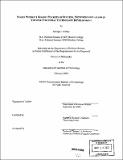Nodes without roads : pockets of success, networks of failure in Chinese industrial technology development
Author(s)
Gilboy, George
DownloadFull printable version (39.40Mb)
Other Contributors
Massachusetts Institute of Technology. Dept. of Political Science.
Advisor
Richard J. Samuels.
Terms of use
Metadata
Show full item recordAbstract
This thesis examines technological innovation capabilities in the Chinese machine tool, automobile, telecommunications equipment, and information technology sectors in the era of reform ( 1979-2002). Contrary to other studies, the thesis reveals that the foundations for Chinese industrial learning and innovation are weak. I evaluate several models for explaining why this is true, including market-, developmental state-, and regional-based explanations. Finding these unsatisfactory, I propose an alternative model: particularist political structure and industrial strategic culture undermine the ability of Chinese firms to associate, learn, and innovate. Particularism and strategic culture interact to undermine reciprocity and trust, weakening the ability of Chinese industrial firms to form effective horizontal association. As observed in economies from the developed (e.g. United States) to the developing (e.g. Taiwan), horizontal association between manufacturers as well as customers, suppliers, financers, research institutes, and universities is critical to industrial learning and technology development. The weakness of associational means for reducing risk and promoting information and resource flows inhibits the ability of Chinese firms to effectively indigenize, diffuse, innovate, and leverage industrial technology. Political particularism - manipulation of state policy and resources by agents of the state in pursuit of parochial goals - intensified during the reform period. Market reforms rendered existing industrial governance regimes ineffective, but the state suppressed formation of new mutual monitoring and consensus-building regimes appropriate to liberalized markets and society. (cont.) Particularist structures inform a Chinese industrial strategic culture - a set of assumptions about order in the economy, and about the best ways of handling challenges and opportunities. Chinese industrial strategic culture is exceptionalist. Firms pursue short-term strategies, develop vertical ties with officials, and eschew horizontal ties to other innovation system constituents in seeking to manipulate state action to their individual benefit. Technology development capabilities in all sectors examined suffered as a result of the interaction of political particularism and industrial strategic exceptionalism. However, some sectors performed better than others. These sectors were characterized by a combination of relatively faster-paced technological change, weaker particularist action, and greater horizontal association among firms and other constituents; they offer a model for possible change in Chinese political economic institutions and technological capabilities.
Description
Thesis (Ph. D.)--Massachusetts Institute of Technology, Dept. of Political Science, February 2003. Includes bibliographical references (v. 2, leaves [483]-502).
Date issued
2003Department
Massachusetts Institute of Technology. Department of Political SciencePublisher
Massachusetts Institute of Technology
Keywords
Political Science.